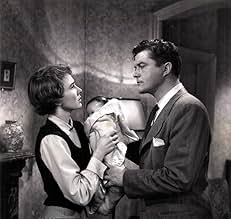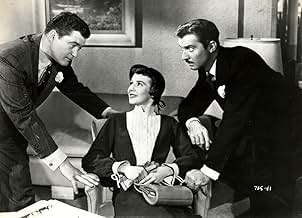Aggiungi una trama nella tua linguaA working girl rises in an ad agency after impressing a baby-food client with her lifelike dolls.A working girl rises in an ad agency after impressing a baby-food client with her lifelike dolls.A working girl rises in an ad agency after impressing a baby-food client with her lifelike dolls.
- Regia
- Sceneggiatura
- Star
- Peggy
- (as Sheila Stephens)
- Train Passenger
- (non citato nei titoli originali)
- Danny
- (non citato nei titoli originali)
- Subway Commuter
- (non citato nei titoli originali)
- Club Patron
- (non citato nei titoli originali)
- Traffic Cop
- (non citato nei titoli originali)
- Passerby
- (non citato nei titoli originali)
- Passerby
- (non citato nei titoli originali)
Recensioni in evidenza
Like Will Success Spoil Rock Hunter? (1957) it is about the advertising industry. But, this one seems more natural--not as forced. Also, we get to see Dennis Morgan, Zachary Scott, and Edmund Gwenn in funny situations such as we have never seen them in before. Here, Dennis Morgan is more than just a singer in for light comedy (he actually gets mad and frustrated here). Zachary Scott proves he can be funny too, and Edmund Gwenn shows how angry and totally confused he can be in this zany situation.
The story: Sam Morley (Dennis Morgan) heads up an advertising firm, and Barry Holmes (Zachary Scott) is his right-hand man. Patsy Douglas (Betsy Drake) works at the firm as a lowly mimeograph operator, but is infatuated with her boss, Morley. One day, Morley's secretary quits her job to get married, and Patsy is chosen to temporarily take her place. She is a failure as a secretary and is soon to be replaced.
However, at the same time, she wins over the firm's chief advertiser, Cyrus Baxter (Edmund Gwenn), owner of Baxter Baby Food—the largest company to advertise with Morley's firm.
How does she win him over?
She does it as the mother with a baby named after Cyrus Baxter while the two happen to be riding in a subway together. However, the baby (covered by a blanket) is not real; it is a doll from the hallway display that Patsy had taken from the advertising agency in order to get a seat in the subway. After being flattered that Pasty would name a baby after him, the normally grouchy Baxter insists that she work on the Baxter account--or he would take his million-dollar account elsewhere. But, what should Morley and Holmes have the untalented Patsy do? Copywriting, i,e, making up advertising jingles for Baxter Baby Food.
The story is zany and fun. It also shows us how to break up a fit of anger: by just start reciting Longfellow's poem, The Song of Hiawatha. If you can say "On the shores of Gitche Gumee..." and still stay angry, you are hopeless.
This is 1950, so women have been "liberated" and male chauvinism is a thing of the past. Where men formerly gave up their seats to women on buses and trollies, the liberated women now fend for seats with the men. Betsy Drake's Douglas is all for the progress that has been made, but she would have preferred that some of the old manners hadn't been thrown out with women's "liberation."
The scenes with Patsy's doll baby and a few others have some comedy. But there's nothing here to evince rollicking laughter. Edmund Gwenn is very good as the grumpy Cyrus Baxter. Some may think that Gwenn is out of his usual character (i.e., his Kris Kringle from "Miracle on 34th Street"), but Gwenn was an accomplished actor who played diverse roles - including some grouchy or distasteful characters.
The other leads, Zachary Scott as Barry Holmes and Dennis Morgan as Sam Morley, are okay up to a point. But Morley's falling for Patsy just isn't believable. There's nothing in the screenplay to even give a hint of romantic inclination on Morley's part - although there is on Patsy's part initially. All of his encounters have been with a fumbling, accident-prone Patsy. He has been upset with her and even though a plot twist leads to her keeping her job, there's nothing romantic until the very end when Morley just suddenly falls for Patsy. It actually came across as a dumb, poor ending as though the writers couldn't think of anything better.
And that gets to Betsy Drake. While she made a few comedies, she had a certain innocence yet intelligence about her persona. So, one tends to like the characters she plays. But she definitely is not a laugh-inducing comedienne. Nor does she have a personal that suggests or invites romance.
As I said, it's a stretch to give this six stars, but most people should enjoy the film and may find it somewhat amusing.
Except. One visit she happened to sit next to Cyrus Baxter himself, the crusty, hot-tempered, terminally unhappy curmudgeon who runs the baby food company. She happens to mention that the baby is named after him, Cyrus Baxter Douglas (the people at the firm named the doll "Cyrus," for obvious reasons), & the old man, not revealing his identity to her, is so flattered that she paid him that compliment that he begins to insinuate himself into her life, to help out the namesake he never knew he had.
As you may well imagine, the movie takes off from there. Morley & his partner find themselves having to promote the well-meaning, earnest Patsy to save the account. If you've seen any screwball comedies, you'll be able to anticipate when & where the plots & plans go awry. Betsy Drake, as Patsy, is a bit of a cipher - not terribly pretty, she has a sort of stagey, Laura Linney-esque way of acting. Neither Dennis Morgan or Zachary Scott as her two bosses have the stand-out traits of characters in a Preston Sturges film, though they do play off each other rather well. Edmund Gwenn as the volatile Cyrus Baxter is the movie's real treat - a sort of diminutive, flustered, uptight second cousin of Lionel Barrymore's Henry Potter. The scene between him & Betsy Drake involving Longfellow's "Hiawatha" is screamingly funny.
Most probably they couldn't make a film like this today, not without the tongue in the cheek as "The Hudsucker Proxy," & cameos in this film of soon-to-be-television-stars William Frawley & Barbara Billingsley reminded me how shows like "I Love Lucy" (where Frawley played neighbor Fred Mertz) made most screwball comedy misunderstandings & false leads into television cliche. But this movie, unrushed & quiet in its charm, unembarrassed about its lack of stars or its silliness, manages to entertain in precisely the way it was meant to. You get caught up beyond its corniness.
It's no "His Girl Friday," but probably wasn't meant to be. It has some good laughs & it's funnier than any modern comedy I've seen recently. Recommended for those who've seen all the Capra & Sturges flicks & can live with a fix that's a couple of shades below.
Lo sapevi?
- QuizThe stack of baby photos which they sort through includes one used in Ribalta di gloria (1942) eight years earlier.
- BlooperAlmost an hour in, as Zachary Scott is convincing Betsy Drake to present Sam's campaign to Cyrus Baxter, he leads her out of the office door, saying, "Now remember, Patsy, the code of the firm..." As Sam's office door closes, at the top of the door can be seen the very bright studio lights that were used to light the scene before."
- Citazioni
Caravan Club Waiter: [at the Caravan Club Morley is at the table while Holmes dances with Patsy] Fresh drink, sir?
Sam Morley: Yes, a double. And, waiter...
[takes out some money]
Sam Morley: here's ten dollars for your trouble. Go to the dance floor and tell Mr. Holmes he's wanted on the phone.
Caravan Club Waiter: Sorry, sir. Mr. Holmes gave me twenty dollars *not* to call him to the phone. Anything else, sir?
Sam Morley: [puts money back] A sharp knife.
- ConnessioniReferenced in Lucy ed io: The Fashion Show (1955)
- Colonne sonorePretty Baby
(uncredited)
Music by Egbert Van Alstyne and Tony Jackson
Lyrics by Gus Kahn
Played during the opening credits and occasionally in the score
Sung by Dennis Morgan
I più visti
Dettagli
- Data di uscita
- Paese di origine
- Lingua
- Celebre anche come
- La linda embustera
- Luoghi delle riprese
- Azienda produttrice
- Vedi altri crediti dell’azienda su IMDbPro
- Tempo di esecuzione1 ora 32 minuti
- Colore
- Proporzioni
- 1.37 : 1
Contribuisci a questa pagina

































